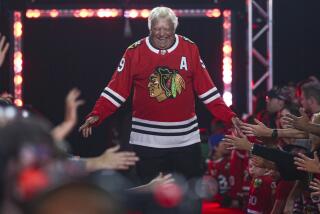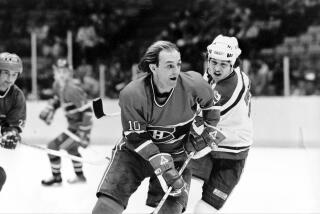Larry Floyd Sizes Up as Gulls’ Big Leader
- Share via
SAN DIEGO — When it comes time to hang up his skates and allow the scars to heal, Larry Floyd will find himself cut off from a nine-year professional hockey career that has been his lifeline.
What he’ll do to fill the void and where he’ll go is undecided. But he’d like nothing more than to stay and pursue his options in the United States.
“I don’t want to live in Canada,” the Peterborough, Ontario, native said. “A week at a time in Peterborough is enough. I want to live in the States.”
Floyd, 29, has established himself as one of the Gulls’ top scoring threats. After the first weekend of play, when he had a hat trick in the team’s winning debut, Floyd was named the International Hockey League’s player of the week and is currently the Gulls’ second-leading scorer with five goals. He also has seven assists.
To play, he needs a work visa, which he has. To stay, he needs a green card, which he doesn’t have. Floyd said he hopes to get the card--mandatory for all non-immigrants and immigrants to work in this country--through his U.S. stepfather, but as a spokesperson for the Immigration & Naturalization Service confirmed, it is a long and complicated process.
Happily, there is a contingency plan.
“I guess I’d have to marry an American girl,” Floyd said.
Tie the knot, and it’s off to work he goes. Until then, however, it’s off to the rink.
Recently, the Gulls have resurfaced as a force in the Western Division, but Floyd has continued to swoon. After getting four goals in the first two games, he hasn’t scored since Oct. 13, when he put in the Gulls’ last goal in a 5-4 loss to the Fort Wayne Komets.
“We’re not getting production from anyone,” Coach Mike O’Connell said. “We can’t put the blame on him.”
Said Floyd: “We’ve had all sorts of chances, but we haven’t been able to put the puck in the net. These things have a way of balancing out, though, and I’m sure there will be a time when everything goes in. During the course of the season, that will come.”
In the interim, O’Connell relies on Floyd, who plays center, for more than points. On a team whose game face changes nightly, Floyd is a cornerstone of consistency.
“He’s played well each game,” O’Connell said of Floyd, who as a captain last year in Phoenix had 39 goals and 40 assists in 76 games. “He’s one of the guys who has made a commitment to this team. He knows what to do, and he takes practice seriously and he takes the game seriously.”
Floyd’s game-day demeanor metamorphoses from a cool head midmorning to uptight by the afternoon, according to his father, Don Floyd.
“Larry can fall asleep early in the day before a game,” Don Floyd said of his youngest of three boys, “but a few hours before, he won’t talk to me. He learned to do that. But he can always leave a game when it’s over.”
It wasn’t so easy for Floyd to leave the major league ranks. Then again, he wasn’t given a choice. Floyd was signed as a free agent by New Jersey in 1982 and, in two seasons with the Devils, he played in only 12 NHL games.
At the start of the 1984-85 season, Floyd made the big leagues, but was soon sent down, never to be recalled.
“I knew what it was,” Floyd said. “It was politics. The first- and second-round picks get all the chances.”
At 5 feet 8, 180 pounds, Floyd said he could have matched other players skill-for-skill, but his size never enhanced his chances.
“Guys in the NHL are bigger and stronger and maybe a little quicker,” he said.
In his case, the emphasis is on bigger.
The experience initially left him bitter, but Floyd said he learned to appreciate that he was making a living as a professional hockey player.
“It was exciting to play up there,” Floyd said. “I got bitter after a while. When you see them calling other guys up before you, when you know you’re better, it makes you wonder.”
Not one to pout, Floyd dusted himself off, put his pride on hold and pressed on.
“It was in the back of my mind, but I didn’t sulk about it because I led the team in scoring that year,” said Floyd, a 40-goal scorer for Wichita in the Central Hockey League in 1982-83, the year he was named rookie of the year.
Don Floyd said Larry was frustrated about his lack of opportunities in the NHL, but never had to worry about landing a job.
“Every year, someone always wanted to hire him,” Don Floyd said.
Floyd’s longest stint was four years with the American Hockey League’s Maine franchise. In 1988, the Austrians extended an invitation and a contract, and he played six months in Innsbruck.
“I got paid to see the world,” he said.
And also to entertain it. Floyd maintains that one of the most rewarding parts of his job is giving the fans something in return for their support.
“They come to see you, to see you play,” he said. “How do you put it, it’s something special. They’re paying money to see you. Little kids look up to you, like role models. That’s kind of neat.”
Floyd’s talents weren’t always limited to the ice rink. He was a lacrosse champion, and fondly remembers, when he was a member of both the Canadian junior and senior national championship lacrosse teams and the Canadian senior national championship hockey team in 1977-78.
Peterborough also has fond memories of Floyd’s achievements.
“No one’s ever done it before (won all three championships),” Don Floyd said. “He’s the answer to a sports trivia question on a local sports radio station. On the senior lacrosse team, when he was 17, he was a boy going against men. People said they had never seen a kid dominate the game like that.”
Never one to shy away from new adventures, Floyd has been introduced to the toys of the beach--Boogie Board and surfboard--and has already bartered with a surfer he met at Mission Beach.
“He’s going to give me lessons if I give him tickets to some games,” Floyd said, smiling.
The soothing effects of the sun and the sea have touched other aspects of his life as well. Floyd, who fell in love with Arizona’s climate last year, said he wouldn’t exchange the warmth of the sun to be able to play anywhere else.
“I love warm weather,” he said. “Here, you can relax. The season doesn’t wear on you as much as in other places. In Phoenix, at the end of the season, it only felt like we had played a quarter of the season. I’m sure it will be the same here.”
More to Read
Go beyond the scoreboard
Get the latest on L.A.'s teams in the daily Sports Report newsletter.
You may occasionally receive promotional content from the Los Angeles Times.






